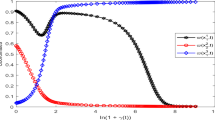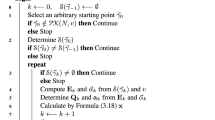Abstract
Equilibrium solutions in terms of the degree of attainment of a fuzzy goal for games in fuzzy and multiobjective environments are examined. We introduce a fuzzy goal for a payoff in order to incorporate ambiguity of human judgments and assume that a player tries to maximize his degree of attainment of the fuzzy goal. A fuzzy goal for a payoff and the equilibrium solution with respect to the degree of attainment of a fuzzy goal are defined. Two basic methods, one by weighting coefficients and the other by a minimum component, are employed to aggregate multiple fuzzy goals. When the membership functions are linear, computational methods for the equilibrium solutions are developed. It is shown that the equilibrium solutions are equal to the optimal solutions of mathematical programming problems in both cases. The relations between the equilibrium solutions for multiobjective bimatrix games incorporating fuzzy goals and the Pareto-optimal equilibrium solutions are considered.
Similar content being viewed by others
References
Wierzbicki, A. P.,Multiple Criteria Solutions in Noncooperative Game Theory, Part 3: Theoretical Foundations Discussion Paper No. 288, Kyoto Institute of Economic Research, Kyoto University, Kyoto, Japan, 1990.
Corley, H. W.,Games with Vector Payoffs, Journal of Optimization Theory and Applications, Vol. 47, pp. 491–498, 1985.
Borm, P. E. M., Tijs, S. H., andVan Den Aarssen, J. C. M.,Pareto Equilibria in Multiobjective Games, Methods of Operations Research, Edited by B. Fuchsstein, T. Lengauer, and H. J. Skaka, Anton Hain, Tonn, Germany, pp. 303–312, 1988.
Nishizaki, I., andSakawa, M.,Max-Min Solutions for Fuzzy Multiobjective Matrix Games, Journal of the Japan Society for Fuzzy Theory and Systems, Vol. 5, pp. 505–515, 1993 (in Japanese).
Rosen, J. B.,Existence and Uniqueness of Equilibrium Points for Concave N-Person Games, Econometrica, Vol. 33, pp. 520–534, 1965.
Parthasarathy, T., andRaghavan, T. E. S.,Some Topics in Two-Person Games, American Elsevier Publishing Company, New York, New York, 1971.
Lemke, C. E., andHowson, J. T., Jr.,Equilibrium Points of Bimatrix Games, SIAM Journal on Applied Mathematics, Vol. 12, pp. 413–423, 1964.
Lemke, C. E.,Bimatrix Equilibrium Points and Mathematical Programming, Management Science, Vol. 11, pp. 681–689, 1965.
Barron, H., andSchmidt, C. P.,Sensitive Analysis of Additive Multiattribute Value Models, Operations Research, Vol. 36, pp. 122–127, 1988.
Bellman, R. E., andZadeh, L. A.,Decision Making in a Fuzzy Environment, Management Science, Vol. 17, pp. 209–215, 1970.
Geoffrion, A. M.,Proper Efficiency and the Theory of Vector Optimization, Journal of Mathematical Analysis and Applications, Vol. 22, pp. 618–630, 1968.
Chankong, V., andHaimes, Y. Y.,Multiobjective Decision Making: Theory and Methodology, North Holland, Amsterdam, Holland, 1983.
Yu, P. L.,Multiple-Criteria Decision Making: Concepts, Techniques, and Extensions, Plenum Press, New York, New York, 1985.
Sakawa, M.,Fuzzy Sets and Interactive Multiobjective Optimization, Plenum Press, New York, New York, 1993.
Nishizaki, I., andSakawa, M.,Two-Person Zero-Sum Games with Multiple Fuzzy Goals, Journal of the Japan Society for Fuzzy Theory and Systems, Vol. 4, pp. 504–511, 1992 (in Japanese).
Author information
Authors and Affiliations
Additional information
Communicated by P. L. Yu
Rights and permissions
About this article
Cite this article
Nishizaki, I., Sakawa, M. Equilibrium solutions for multiobjective bimatrix games incorporating fuzzy goals. J Optim Theory Appl 86, 433–457 (1995). https://doi.org/10.1007/BF02192089
Issue Date:
DOI: https://doi.org/10.1007/BF02192089




